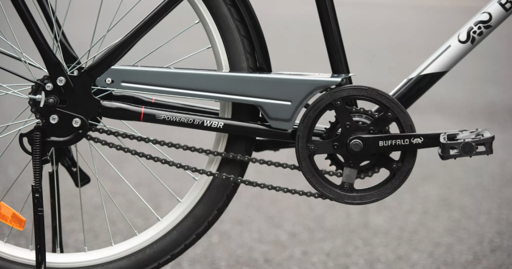Chicago-based nonprofit World Bicycle Relief (WBR) doesn’t distribute just any type of bicycle ??? it distributes bicycles meant to navigate the unimproved roads and rough terrain of developing nations, empowering populations to access healthcare, education and economic opportunities that would???
For some background about World Bicycle Relief and the original “Buffalo Bike”, see this video by Berm Peak on Nebula (also YouTube).
As for the 2-chainz design, I think it’s fairly brilliant, as a way to avoid a delicate derailleur, which MTBers will know is vulnerable on terrain due to being low-slung. This sort of thinking also highlights how engineering and design make tradeoffs, since the weight penalty of an extra chain is not important when the ultimate objective is a rugged, durable bicycle.
Your “2-Chainz” link goes to the article on the actor, not the bicycle design.
That’s the joke
Instead of equipping the bike with a bunch of cogs, cables and added components, it’s split the powertrain out into two separate drives: a high chainring connected to a rear cog via a dedicated chain and a low chainring chained to a second rear cog on the same hub. All hardware is located on the right side of the bike, and the rider simply backpedals half a revolution to activate the switchable freewheel from high to low and vice versa.
Neat idea! The shifting cog might be a unique part that’s hard to source but maybe they found a way to macguyver it from common parts, or worst case scenario one could slap a standard cog and some spacers on there in a pinch.
What’s with all “???” in the description, my dude???
It looks like a character encoding issue: the two characters replaced by “???” are the non-ASCII “—“ and “…”.
Good old charset error?
Sounds like it.
so if one chain breaks can you change gears and keep going? Is that what they are talking about with redundancy?
I think so re redundancy – but the primary benefit is not having fragile and high-maintenance derailleurs, as I understand it.
This only happened due to the shift to 50 gears. Have a 7-9 speed and it’s sturdy enough.
I’ve abused the hell out of my basic-ass Shimano 3x7 and it’s still going strong. The only thing I’ve replaced is the cables after a decade or so lol (they still worked, but I got new handlebars). These bikes are an order of magnitude more robust though.
I rode a two speed kickback bicycle similar (operationally) to this for about a decade. It was the lowest maintenance bike I’ve ever owned, but the gearing was inside the rear hub and it only had a single chain. I can’t imagine that the mechanism being outside improves that.
I wonder why you don’t see variations on those sealed three-speed gearboxes you used to see on British bicycles. They seem to have few exposed parts.
We do? They have internally geared hubs of up to 12 speeds now (but they are very, very, very expensive - check out Rolhoff, they’re pretty much the gold standard of internally geared hubs, if you want something more affordable Shimano Alfine is much more affordable and does 8x I believe)
I figured the old Sturney-Archer gearbox on the 80% rust Raleigh my dad used to ride was more on the lines of… affordable.
Yeah, but IGHs have come a good ways, you can get something really not bad at all for not all that much.
How is this better than a hub gear with a single chain?
rtfa
Repairability
Sounds like it could be good for the unimproved roads and rough terrain here in Michigan too
This is why my commuter is a hardtail MTB lol
I am so in love with the idea of this bike and it’s predecessor the Buffalo, and I really wish that they would turn their attention for “relief” towards North America. I am sure that there are many people in Africa who benefit greatly from these bikes, but the “we’re going to save your community because you haven’t discovered bikes yet” model is pretty heavily loaded with some at-least-orange flags for white saviorism.
I really wish that instead of (or at least in addition to) trying to save the poor people on the other side of the world, they’d send a few dozen of these things to homeless shelters around the country. I understand that many people don’t think homeless people deserve nice things and might think this is a waste, but the freedom and mobility of a bicycle is just as powerful for lifting people out of poverty here as it is in Africa.
I’ll take two!
Chains?
dual wield chains
I prefer walking







